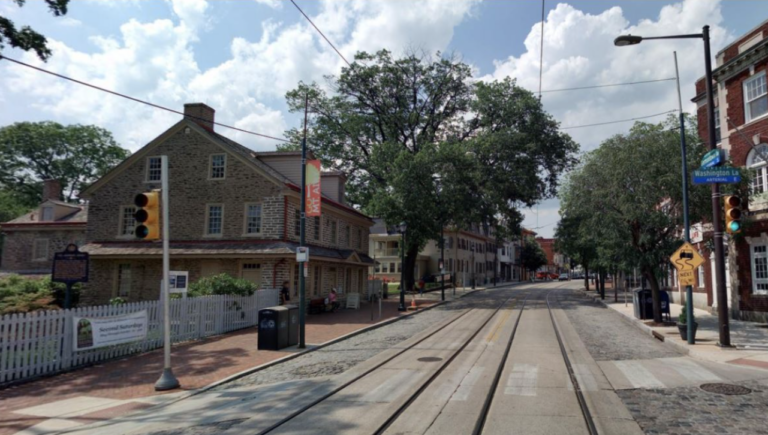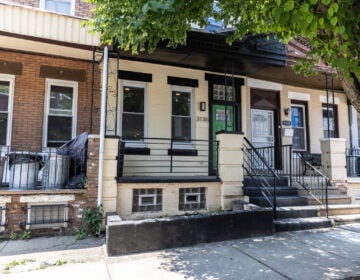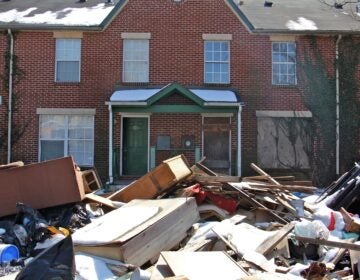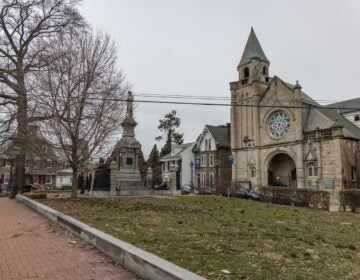Germantown rezoning highlights neighborhood tensions over parking, density
The rezoning would change the rules for building in a historic neighborhood experiencing a boom as demand for housing swells in the city.

A view of the intersection of Germantown Avenue and Washington Lane in the northern Germantown district. (Google Streetview)
The Philadelphia City Planning Commission, or PCPC, is eying a rezoning plan for northern Germantown, with a focus on imposing new rules mandating developers provide parking with their projects and putting limitations on building.
The rezoning plan, which is currently up for public review, would create the new rules for building in a historic neighborhood experiencing a boom in growth as demand for housing swells in the city. It ticks off a laundry list of local priorities both big and small: Reacting to neighbor complaints about increasing density and parking problems, imposing a facade review process, limiting housing development in a flood-prone area, and remapping some irregularly zoned parcels to conform with their surroundings.
Perhaps most significantly, the plan would expand an existing parking overlay along Germantown Avenue to an area between Rittenhouse to Johnson streets. The overlay mandates that any new developments that feature more than 10 units provide off-street parking lots or garages.
Although planners originally issued rezoning recommendations for the area back in 2018, Councilmember Cindy Bass’ office said the office requested a second look at the area, following the commencement of several by-right apartment construction projects.
“There [are] currently a number of multi-unit building projects on and around Germantown Avenue. A lot of these projects do not include parking, which has resulted in the displacement of residential spots,” said William Careri, a spokesperson for Bass. “Our office reached out to have the remapping initiated because of the parking issues our neighborhoods were experiencing.
The overlay would also exempt development fronting Germantown Ave, a commercial strip that dates back to the colonial era, from ground-floor commercial requirements and trigger a “facade review” process overseen by PCPC for all new buildings or major alterations. Typically, such a review is mandated only for buildings that are designated as historic and subject to protections.
The remapping shares similarities with other resident-driven efforts to limit neighborhood change in areas that have attracted development. Other sections of the city have seen neighbors and councilmembers push for height restrictions as a means to preserve character and limit gentrification and a variety of other restrictions. But, often, these efforts have unintended consequences and can limit the development of housing.
In its own citywide “Philadelphia 2035” planning guidelines, the City Planning Commission broadly set a goal of directing more “multifamily housing development to commercial streets and train stations” in the same area now targeted for rezoning. But parts of the proposed rezoning along Germantown Ave, which hosts transit agency SEPTA’s Route 23 bus, would instead make some of those developments more complex and difficult to construct. The plan covers the area roughly bounded by Rittenhouse Street and Johnson Street between Wissahickon and Chew Avenues.
Ian Hegarty, a commission planner, said the parking restrictions were modeled on a similar overlay along Ridge Avenue, and said the commission had attempted to weigh its own recommendations against priorities articulated by neighbors and Bass’ office.
“People are just concerned about density, height, and potential negative impacts of development that’s not carefully planned or doesn’t get a good vetting,” he said. “There were by-right permits pulled for the development of market-rate apartment housing. That was not something that was common in previous building cycles, and now we’re seeing that.”
Hegarty pointed out that the proposal also includes a plan for corrective remapping of properties across the neighborhood and, in some instances, PCPC had proposed adding more density or eliminating older, auto-centered uses. An area near the Tulpehocken regional rail station is being eyed for an “apartment-type district,” while another parcel zoned for strip mall uses would be changed to accomodate mid-sized mixed use development, for example.
“We are trying to position some of the lesser-used sites that are now just parking for housing and development,” the city planner said. “The Planning Commission has been supportive of reducing vehicle miles traveled by creating neighborhoods that are not so automobile-dependent. But we’re hearing from people who really would like to ensure new buildings aren’t bringing a lot of new cars. And we have to strike a balance between those competing concerns.”
Ben She, from urbanist political advocacy committee 5th Square, which promotes denser development, criticized the plan, which comes as some other cities and states have moved to abolish long-established restrictions, like single-family housing, altogether.
The advocate said it would ultimately increase housing costs by limiting supply and that it was wrongheaded to attempt to curb multifamily development in the comparatively sparsely populated section of the city in order to address nuisance issues.
“City Council has taken upon themselves to redefine zoning through these overlays,” he said. “Local quality-of-life issues, like parking or density concerns, are taking precedence over housing more people in places that could really use it, like Northwest Philly.”
She said that neighbors’ concerns could be better addressed through other policy tools, like employing permit parking or other regulations to combat parking issues, or increasing transit service to the area.
Bass’ office did indicate they were also pursuing regulations that would limit on-street truck parking, among other zoning changes meant to respond to neighborhood complaints.
“Moving forward, we expect a lot of conversations to be had between the Planning Commission and our legislative director … to continue to plan appropriate parking conditions for our residents,” Careri said.
PCPC is currently soliciting public comment on the northern Germantown plan and expects to present a draft rezoning ordinance to City Council on October 21.

Subscribe to PlanPhilly
WHYY is your source for fact-based, in-depth journalism and information. As a nonprofit organization, we rely on financial support from readers like you. Please give today.









